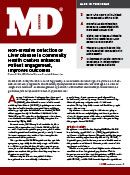Outcomes of Acute Coronary Syndrome in Inflammatory Bowel Disease Patients
These findings underline the importance of aggressive management to treat IBD and ACS comorbidities to improve outcomes.

While hospitalizations for acute coronary syndrome (ACS) in patients with inflammatory bowel disease (IBD) were stable in recent years, the ACS-related risk profiles and mortality were modestly favorable in patients with IBD-ACS compared to non-IBD with ACS patients, according to a new study.
A team of investigators from several countries retrospectively compared IBD patients without ACS to IBD patients with ACS in order to determine the epidemiology and outcomes of ACS in patients with IBD.
The investigators noted that IBD has been associated with an increased risk of ACS and heart failure in prior studies that focused on epidemiology. There are differences between Crohn’s disease (CD) and ulcerative colitis (UC) as they related to ACS that the team wanted to explore as well.
There were about 6.8 million non-IBD plus ACS patients in the investigation that were compared to 24,220 IBD and ACS hospitalizations (of which about half had UC). The patients were hospitalized between 2005-2015. The investigators collected data about admissions, mortality, risk profiles, management strategies, and in-hospital mortality, which was broken down by IBD/ACS, non-IBD/ACS, and CD and UC.
The IBD patients were more likely to be female, white, have higher income, and have a higher prevalence of connective tissue disease, pulmonary disease, coagulopathy, depression, liver disease, hypothyroidism, weight loss, anemia, and atrial fibrillation compared to the patients without IBD, the study authors found.
The mean age of the IBD cohort was 67 years, and about two-thirds were insured by Medicare/Medicaid.
The most common traditional cardiovascular risk factors included hypertension, dyslipidemia, smoking, diabetes, chronic kidney disease, and obesity. The study authors learned that patients with IBD and ACS were less likely to have these traditional cardiovascular risk factors. However, the comorbidities and complications that are frequently associated with IBD were strongly associated with mortality from ACS, the study authors said.
The patients with CD in the study were admitted to the hospital with ACS at an average of 3 years younger than the patients with UC, the study authors noted. On the subject of age, the study authors said that ACS in CD was found at a younger age and at a higher proportion of females compared to the general population (48% vs. 40%, respectively), but these demographics in UC patients were aligned with the general population.
The overall in-hospital mortality for patients with IBD and ACS was 5.3% and was higher in patients without IBD, the study authors said. Additionally, they found the overall mortality rate was similar between patients with UC and patients with CD (4.1% and 3.7%, respectively). They also noted their results were similar across groups regardless of age, sex, ACS type, and utilization of invasive management strategy for ACS.
Study author Gayatri Pemmasani, MBBS, told HCPLive® the team concluded the Medical comorbidities and complications that were more prevalent in patients with IBD—including gastrointestinal bleeding, weight loss, coagulopathy, and electrolyte abnormalities—were greatly associated with increased ACS mortality.
“These data regarding the predictors of mortality provide guidance for the early identification of these factors and appropriate management of patients with IBD who are at a higher risk of death from ACS,” Pemmasan said. “More aggressive medical management of IBD to reduce the inflammation, disease progression, and incidence of these disease-related comorbidities may help reduce cardiovascular morbidity and mortality.”
Investigators added they identified a two- to three-fold higher risk of myocardial infarction in patients with IBD compared to patients without IBD, and a slightly higher rate in patients with CD compared to those with UC.
“More aggressive medical management of IBD to reduce the inflammation, disease progression, and incidence of these disease-related comorbidities may help reduce CVD-related morbidity and mortality,” investigators concluded.
The study, “Epidemiology and Clinical Outcomes of Patients With Inflammatory Bowel Disease Presenting With Acute Coronary Syndrome,” was published online in Inflammatory Bowel Diseases.
